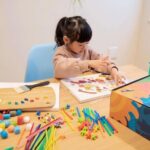There are four crucial areas that parents should focus on to help their children develop their brains and improve their memory.

 Create a Positive Learning Environment
Create a Positive Learning Environment
Parents should design a comfortable, quiet, and well-lit study space for their children. If possible, create an ideal study area with suitable furniture and essential study tools such as books, pens, and reference materials.
Additionally, decorating the learning space with educational charts, diagrams, and visuals will stimulate creativity and interest. Fun illustrations and colorful visuals will create a sense of excitement, spark imagination, and facilitate easy association with new knowledge.
Encourage your children to engage in diverse learning activities, from reading books and working on projects to participating in extracurricular classes. These activities will not only broaden their knowledge but also develop their social skills and critical thinking abilities.
Involvement in clubs, research groups, or physical activities will teach them about teamwork and building friendships.
Moreover, parents should regularly set aside time to discuss what their children are learning. This helps reinforce knowledge and creates a friendly atmosphere for sharing ideas and emotions. A positive learning environment will not only aid in knowledge acquisition but also foster a lifelong learning habit.

Creating a positive learning environment.
 Encourage Curiosity and Questioning
Encourage Curiosity and Questioning
The age of 3 to 5 years is a golden period to spark a love of learning as children are naturally curious about everything, from natural phenomena to social relationships.
Parents should encourage children to ask questions and seek answers independently. When children ask “Why?” or “What?”, it’s an opportunity to develop critical thinking and analytical skills, which are essential for future learning and problem-solving.
Parents can actively participate in this process by patiently answering their children’s questions or exploring information together.
Furthermore, parents should encourage children to explore diverse information sources such as books, educational videos, or group discussions. This will not only broaden their knowledge but also teach them how to find and evaluate accurate information.
Instead of simply providing answers, parents can ask open-ended questions like, “What do you think about that?” or “Are there other ways to explain this?”. This encourages deeper thinking, and creating lively discussions about topics of interest helps reinforce knowledge and creates fond memories.

Encouraging curiosity and questioning.
 Foster Early Self-Directed Learning Habits
Foster Early Self-Directed Learning Habits
Encouraging children to explore, research, and discover knowledge independently helps develop study skills and nurtures confidence and independence.
Parents should provide opportunities for children to engage in their favorite learning activities, whether it’s solving math problems or conducting simple science experiments at home. These activities allow children to apply theoretical knowledge practically and foster creativity and problem-solving skills.

Fostering early self-directed learning habits.
To nurture this habit, parents should encourage children to choose topics they are passionate about, ranging from astronomy and biology to art and painting. Provide opportunities for children to engage in projects like gardening, recycling toys, or even starting a personal blog to share their learnings.
Help your children establish a clear study schedule that includes reasonable study and break times. Developing a study habit early on will boost their confidence in approaching knowledge in the future.
This schedule can include time for reading, homework, outdoor activities, and relaxation.
 Play Brain-Boosting, Memory-Enhancing Games
Play Brain-Boosting, Memory-Enhancing Games
Parents can choose games that develop cognitive abilities, such as puzzles, memory games, or strategy games. These games not only enhance memory but also provide a fantastic opportunity to bond as a family.
Join your children in these games, creating enjoyable moments while facilitating natural and effective learning.

Playing brain-boosting, memory-enhancing games.
Parents with a long-term vision should take concrete actions to support their children’s intellectual development and learning abilities. Creating a positive learning environment, encouraging curiosity, fostering self-directed learning habits, and playing brain-boosting games are crucial steps toward raising smarter children.
When children are nurtured in a positive environment, they will grow into exceptional individuals ready to face future challenges.
Is Poor Academic Performance Linked to Low IQ? Expert Reveals All.
Absolutely not! Academic performance and IQ are not directly correlated. While a high IQ can be advantageous, it is not the sole determinant of a child’s academic success. A myriad of factors, including work ethic, study habits, and learning environment, play a pivotal role in shaping a child’s academic trajectory.





































